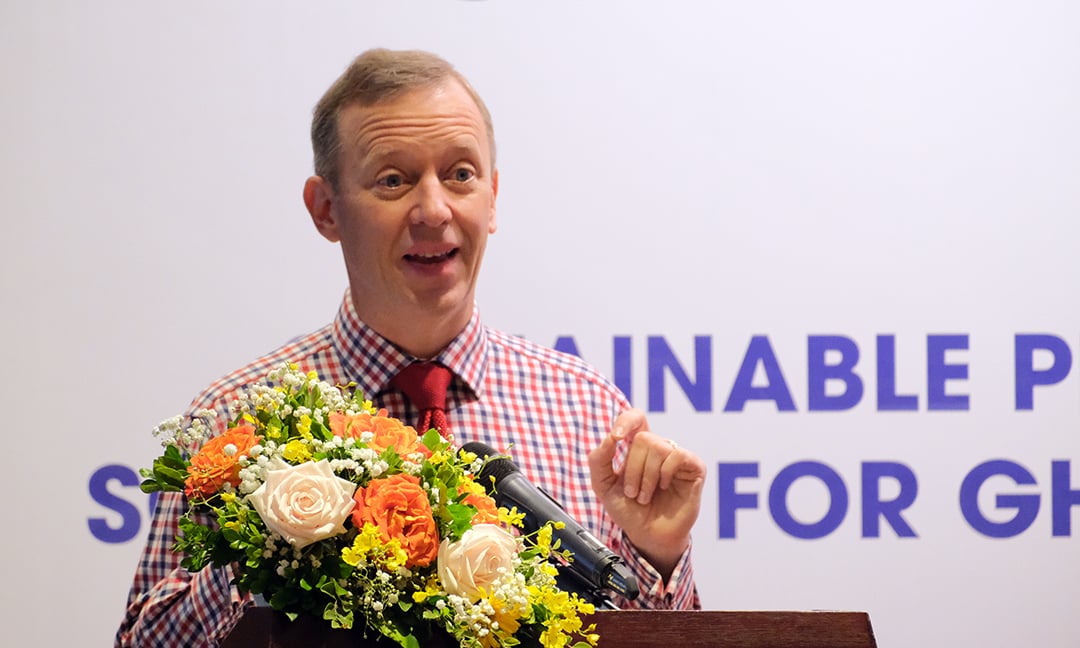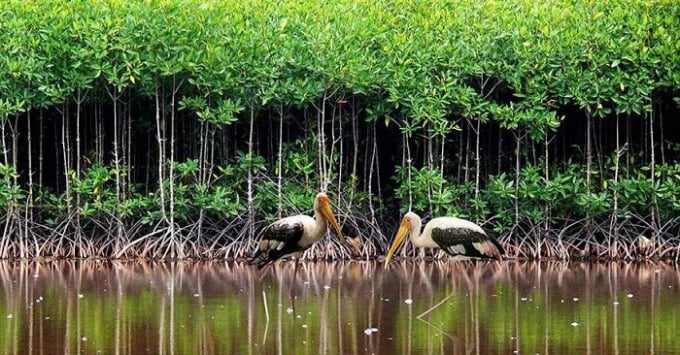May 24, 2025 | 16:19 GMT +7
May 24, 2025 | 16:19 GMT +7
Hotline: 0913.378.918
May 24, 2025 | 16:19 GMT +7
Hotline: 0913.378.918

Ambassador Gareth Ward speaking at a seminar on the morning of March 10.
At a seminar titled "Protection and sustainable development of coastal forests - Solutions for greenhouse gases emission reduction and economic growth”, Mr. Gareth Ward, British Ambassador to Vietnam, said that mangroves play a significant role in climate change adaption.
"Mangroves are five times more cost-efficient than man-made infrastructure in protecting coastal communities from tsunamis and storm surges, as they can lower wave heights by up to 60% and tsunami depths by up to 30%," Mr. Ward explained.
Among forest types, mangroves have the greatest capacity to absorb carbon. They can absorb up to four times more carbon than a rainforest on land. Coastal forests, particularly mangroves, are also critical for natural processes such as water purification, shoreline stability, construction materials, and energy generation.
Mangroves are also a critical factor in maintaining several important aquaculture products in Vietnam, including shrimp and crab. They have assisted coastal communities in gaining income and securing food sources for hundreds of years.
Despite their enormous importance, mangroves are forced to compete for economic growth with other land uses. The world's mangrove areas have been vanishing at an alarming rate. Over the last 40 years, 35% of mangroves has been lost.
Vietnam is one of the world's most vulnerable countries to climate change, largely owing to its coastline's length. The Mekong Delta, in particular, which is home to almost 20 million people, is experiencing several issues as a result of climate change, including storm surges, sea-level rises, and salt intrusion.
"The UK government has prioritized climate change in our engagement with Vietnam," Mr. Ward stated.
According to the ambassador, Vietnam can use mangroves as a weapon in the battle against climate change. "That is not available in the United Kingdom, and I look forward to seeing a mangrove forest in Vietnam someday".

Mangroves account for about 1% of Vietnam's total forest area.
The Ambassador expressed his appreciation for Prime Minister Pham Minh Chinh's pledge at COP 26 to reduce greenhouse gas emissions to zero by 2050, similar to the United Kingdom.
Mr. Gareth Ward recommended the engagement of relevant authorities, notably the Vietnamese Administration of Forestry, in converting commitments into actions. "Forestry is critical in attaining climate change goals, particularly in the shift to renewable energy," he concluded.
As well as enhancing resilience, mangroves offer local populations with short- and medium-term livelihoods and revenue. In Vietnam some excellent approaches have been implemented, such as shrimp farming in mangroves.
According to 2019 statistics on forest resource development, the total area of coastal forest and forest land was 709,013 hectares, distributed among 600 communes, wards, and towns in 130 districts, managed by 28 centrally-run coastal provinces and cities.
The forested land area was 454,337 hectares, with coastal forests accounting for around 3% of the total national forest area and mangrove forests accounting for approximately 1%.
Between 2015 and 2020, the country as a whole implemented 140 initiatives aimed at protecting and developing coastal forests, including 295,164 hectares of coastal forest protection; 22,390 ha of afforestation; and 4 million dispersed trees.
Translated by Linh Linh

(VAN) In the tranquil wetlands of Van Long, there are quiet souls who guard the forests, nurture the waters, and oversee every bird and troop of langurs as protecting the essence of a living heritage.

(VAN) WWF, GIZ, IUCN, UNDP call for biodiversity conservation and sustainable development must be regarded as a unity in strategies for a green future.

(VAN) On celebration of International Day for Biological Diversity, Deputy Minister Nguyen Quoc Tri called for practical actions to address nature and biodiversity conservation.

(VAN) Dr. Hoang Thi Thanh Nhan – Deputy Director of the Nature and Biodiversity Conservation Agency – highlighted this on the International Day for Biological Diversity, May 22, 2025.
![Ho Chi Minh city adapts to climate change: [2] Accelerating action](https://t.ex-cdn.com/nongnghiepmoitruong.vn/608w/files/chiqk/2025/05/22/4024-4220-bien-doi-khi-hau-1-100626_766.jpg)
(VAN) Clearly recognizing the challenges posed by climate change, Ho Chi Minh city has swiftly shaped its policies and implemented practical solutions to adapt.

(VAN) Rice straw is no longer just a discarded byproduct, but it is becoming a green resource that helps farmers in the Mekong Delta reduce emissions and promote circular, sustainable agriculture.

(VAN) Other Effective Area-based Conservation Measures (OECMs) are solutions that contribute effectively to achieving the goals of the Kunming–Montreal Global Biodiversity Framework.